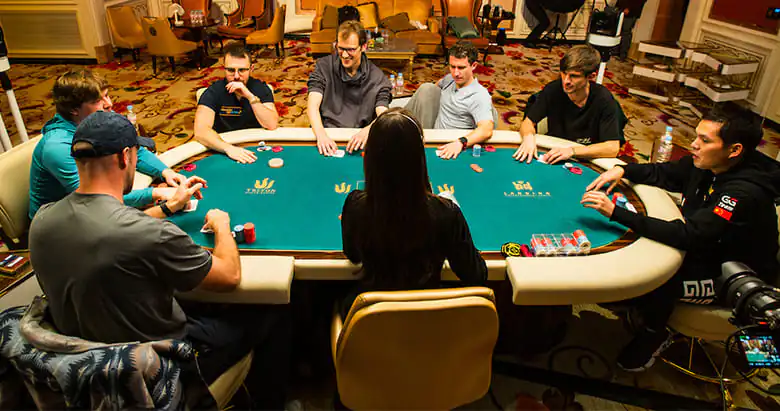How to “Juice” a Poker Table
My favorite part of playing poker live is getting to juice a table. You’ll see lots of the pros do this as well. Not only does it make you more money, it’s just fun. I try not to stop talking the entire time I’m playing. As long as you aren’t pissing people off, it’s a perfect way to have a good time. If you’re polite, and people like you, constantly talking is just another distraction for the other players.
-
T&Cs Apply | Play Responsibly | GambleAware
18+ | Play Responsibly | T&C Apply
-
T&Cs Apply | Play Responsibly | GambleAware
+18 / T & C apply / Play responsible

- Fact Checked by: PokerListings
- Last updated on: July 22, 2025 · 6 minutes to read
Make Poker Prop Bets
The first part in juicing a table is keeping the energy up. The more fun you can keep everyone having at the table, the more money you will be able to extract from them.
By far my favorite way to induce action and keep the energy up on a table is to get some prop bets going. If you just want to get some energy into the table, I like to find someone who will play the part at the other end of the table.
Start up a red/black prop bet (if all three cards on the flop are red, he pays you; all black, you pay him).
Every single flop you want to be cheering for your cards; cheer when you hit; get other people cheering with you. Make a presentation of paying and getting paid when you win or lose.
Be noisy, but don’t be rude. You don’t want to piss people off by being loud, that just gets you kicked out. Your goal is to get the whole table smiling and laughing.
The Deuce-Seven Game
The best prop bet to get action on the table is the deuce-seven game. Thanks to the fourth season of High Stakes Poker, many amateur poker players now know what this game is. Before the show, it used to be much more difficult to get the game going on lower-limit tables.
The idea is simple: everyone who’s playing the game on the table agrees that if you win a pot with deuce-seven on any street, they all pay you the agreed-upon amount. This gets people bluffing with deuce-seven, and gets people making big calls thinking you’re betting deuce-seven.
It gets the whole table gambling and having a good time. And the best part? It’s one more thing for the amateurs to think about. It’s always best to have them distracted from the game.
I highly recommend you don’t prop-bet amounts large enough to influence the game. You shouldn’t affect the way the game is being played because of your antics.
If the prop bet amount becomes larger than the pot amounts, it will affect the game, and not in a good way. You want people to play stupid poker, but if the game changes, not them, they’ll notice and get uncomfortable.
How Do Straddles Work in Poker?
If your games need an action injection, then straddling is always an easy way to get that going. If you can get a few people in a row to straddle, it’s usually easy to get the rest of the players to do it. Cheer for the other players when they straddle; make them feel special for doing it. You’ve just convinced someone who rarely plays a hand to put two bets into the pot in bad position. That’s always good for you.
Following the same logic, follow a straddle with a raise blind. On a $1/$2 blind game, the blinds would go $1, $2, $4, $6. Instead of $3 dead, there is now $13 in the pot. You’ve just created a pot pre-flop before anyone has seen cards. This induces action, but it’s mostly at your own expense. This move is strictly for action-inducing purposes. It’s another way to convince a table you’re not as tight as you really are. It looks like you want to gamble if you’re making moves like this, when in reality $6 is a cheap advertisement.
Straddling does not give you an advantage. Some people think that it gives them an advantage, because they get to act last pre-flop. This feeling comes from not being confident to play in early position. But really all you have done is increase the size of the pot for you to play all subsequent streets out of position. As the majority of hands you can be dealt are rags, you’re more often than not doing this with the least hand equity. Therefore, straddling without making a show of it to induce action is adding nothing to your game.
How to Induce Tilt in Poker
Tilting a player is the favorite pastime of all professionals. An easy way to tilt a player with a huge ego is to bluff them off a pot, then make a deal of showing it to the entire table. Tilting occurs naturally when people get sucked out on. People will just go on tilt and self-destruct. You want to take advantage of these times. The more money you can take off someone on tilt, the better the odds they’ll remain on tilt.
After they recover, some players are even thrown back onto tilt by just bringing up the beat again. “I still can’t believe that he hit that two-outer … that was a huge pot.” Be sure to remind them of the money, since losing it is what caused the tilt in the first place. On the surface, you’re being a nice guy at the table; in reality, it gets them thinking about the hand again. When a new player comes you can get the tilted player to tell them the story of the sick beat.
You want players to tilt, and you want to keep them on tilt. Money bet at you in anger and spite is worth just as much as money legitimately bet. Do yourself, and your roll, a favor. Choose a good table and a good seat, and adjust your game according to the seat you’re in. Juice the table to keep the seat profitable, or to change the dynamics at a weak table.
Pumping Up the Action Without Losing Control
Engaging the table is a balancing act: you want big pots and lively betting, but you also need to steer clear of behaviors that chase players away or irritate them. It’s a bit like hosting a party—give everyone a good time, and they’ll stay longer, spend more, and occasionally make questionable plays in your favor.
If you’re naturally social, you’ll excel at this. Keep the chatter fun, not forced. Light teasing or friendly ribbing is fine, but avoid nastiness. Your goal isn’t just to create action; it’s to make the environment so entertaining that your rivals forget they’re supposed to be watching their bankroll.
Building Momentum
One method to boost energy without breaking the game is introducing low-stakes side bets—similar to the red/black flop wager, but you can go further. Try a small “last card suits” prop, where if the river is clubs, for example, you owe the other participants a small amount. The exact prop doesn’t matter as much as the enthusiasm it generates.
Keep the amounts low enough that nobody plays differently because of the side action. You don’t want players suddenly folding a monster draw just to avoid paying your silly prop bet. Keep it light, and the table will stay relaxed while having something extra to cheer—or groan—about each hand.
Turning Up the Heat
Straddles can transform a sleepy room into a hotbed of excitement. After one player straddles, give a raucous cheer and encourage others to join the “straddle train.” Laughter and camaraderie will often lure even timid players into posting that extra blind.
Be warned, though: if you’re frequently the one straddling, you’re putting chips in out of position. The real advantage is in convincing others to do it. They’ll commit more chips with minimal hand knowledge, gifting you better pot odds when you pick your spots more carefully. If you want to look extra wild, consider posting a blind raise on top of your straddle, just for show. It creates a bigger pot, and other players will assume you’re a gambler at heart—even if you’re actually carefully waiting for profitable hands.
FAQ
What kinds of side bets keep the game lively without altering the poker itself?
Small prop bets like red/black flops or guessing suits on the river keep energy high. They’re fun and harmless if the stakes are too small to change anyone’s play.
How do I avoid irritating the table while trying to boost action?
Keep the mood light. Be friendly rather than loud or condescending. Focus on shared humor and mutual enjoyment, rather than singling someone out in a negative way.
Do straddles really benefit my bottom line?
Straddling yourself can be risky, since you’re putting in chips with no positional advantage. The real edge is getting others to straddle, creating bigger pots for you to target with strong hands.
Are players more likely to tilt in a juiced game?
Yes. Faster action and fun side bets can distract players and ramp up emotions. If someone suffers a bad beat in a lively setting, they may tilt harder or chase losses more aggressively.
Is there a point where too much table talk becomes damaging?
Absolutely. The trick is balance. If the vibe shifts to hostility or if you talk over people constantly, you risk making them uncomfortable. Once the energy becomes negative, the fun factor (and your advantage) disappears.
-
- 100% up to $2000
T&Cs Apply | Play Responsibly | GambleAware
18+ | Play Responsibly | T&C Apply
-
CoinPoker4.1
- 33% Weekly
- 150% up to 2000$
T&Cs Apply | Play Responsibly | GambleAware
+18 / T & C apply / Play responsible
-
Stake.US Poker4.3
- Rakeback 5%
- $55 Stake Cash + 260K Gold Coins
T&Cs Apply | Play Responsibly | GambleAware
18+ | Play Responsibly | T&C Apply
-
- 100% up to $1000
T&Cs Apply | Play Responsibly | GambleAware
T&Cs Apply | Play Responsibly | GambleAware
-
T&Cs Apply | Play Responsibly | GambleAware
18+ | T&Cs Apply | Play Responsibly | GambleAware



